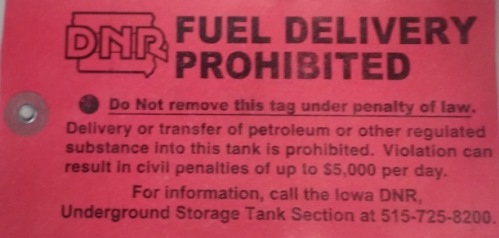Delivery Prohibition
Delivery of fuel is prohibited if an underground storage tank does not have the annual tank tag for the current year attached to the fill port or if the tank has been red tagged for other compliance issues prohibiting fuel delivery. An annual tank tag may not have been issued due to non-payment of the tank management fee, temporary closure, lack of current pollution liability insurance, no trained Class A/B operator or an outstanding violation. Red tags are attached to the fill pipe to prohibit fuel delivery due to outstanding violations.
Here is a list of underground storage tank sites that currently cannot have fuel deliveries. The first part of the list contains sites that were active but current tank tags have not been issued or tanks have been red tagged. The second part of the list are sites that are temporarily closed. The list can change daily as sites come into compliance so check frequently. If there is a question concerning a site or tank, please contact the DNR UST Section.
Fuel Delivery Prohibition List
Temporarily Closed List
Red Tag Authority
If a significant violation is discovered and it poses an imminent threat to human health or safety or the environment, DNR is authorized to affix a red tag to the fill pipe of the noncompliant underground storage tank system. This will prevent new product deliveries to the site. A delivery prohibition, or "Red Tag", is a drastic and severe penalty to the owner/operator. It may mean running out of product and losing business. Further, it can lead to an administrative order that carries a fine and/or penalty. Before affixing a red tag, DNR will notify the owner/operator and inform them of the significant violation and why the red tag was issued.
Violations that may initiate red tag authority or delivery prohibition include:
- failure to conduct leak detection
- expired or lapsed UST pollution liability insurance
- failure to conduct a compliance inspection
- failure to conduct function tests and/or line tightness tests
- failure to install spill protection and/or overfill prevention, corrosion protection
- failure to monitor leak detection or corrosion protection
- failure to undertake release abatement, investigation and confirmation in response to a confirmed or suspected release
DNR warns the owner/operator that a delivery prohibition will be enforced and gives them sufficient time to come into compliance. If the owner/operator does not resolve the violation in the time allowed a red tag is placed on the fill ports of the tanks. The tag looks like this:

It is the responsibility of the owner to correct the violation(s) and notify DNR. DNR will inspect the facility within 5 business days of the violation(s) correction to ensure the violation(s) have been resolved. Once the violation has been verified as corrected, the DNR will remove the red tag and allow the facility to receive fuel deliveries.
Sites Undergoing Enforcement Action
Sites that have been referred to legal for serious UST violations, and have either an administrative order or expedited enforcement order.
The goal of an Expedited Enforcement Order is to return a facility to compliance in a timely manner, eliminate the economic benefit of noncompliance, and create a deterrence against future noncompliance.
The first step in this process is usually a Show Cause letter, which details the specific facility violations. This is followed by a meeting between facility representatives and Department of Natural Resources (DNR) staff to discuss and agree upon a compliance schedule and penalties.
If no agreement is reached during the meeting, the DNR will issue an Administrative Order (AO). The Administrative Order specifies the compliance activities, timelines, and penalties that must be met. Unlike the Show Cause procedure and meeting, the compliance conditions and penalties are set solely by the DNR The business may opt to contest the Administrative Order, in which case the business representatives must appear before an administrative law judge to defend their position.